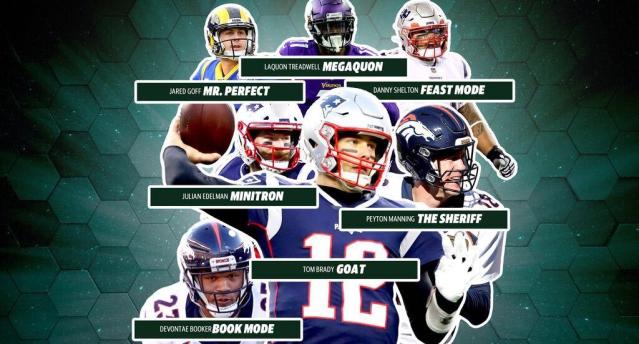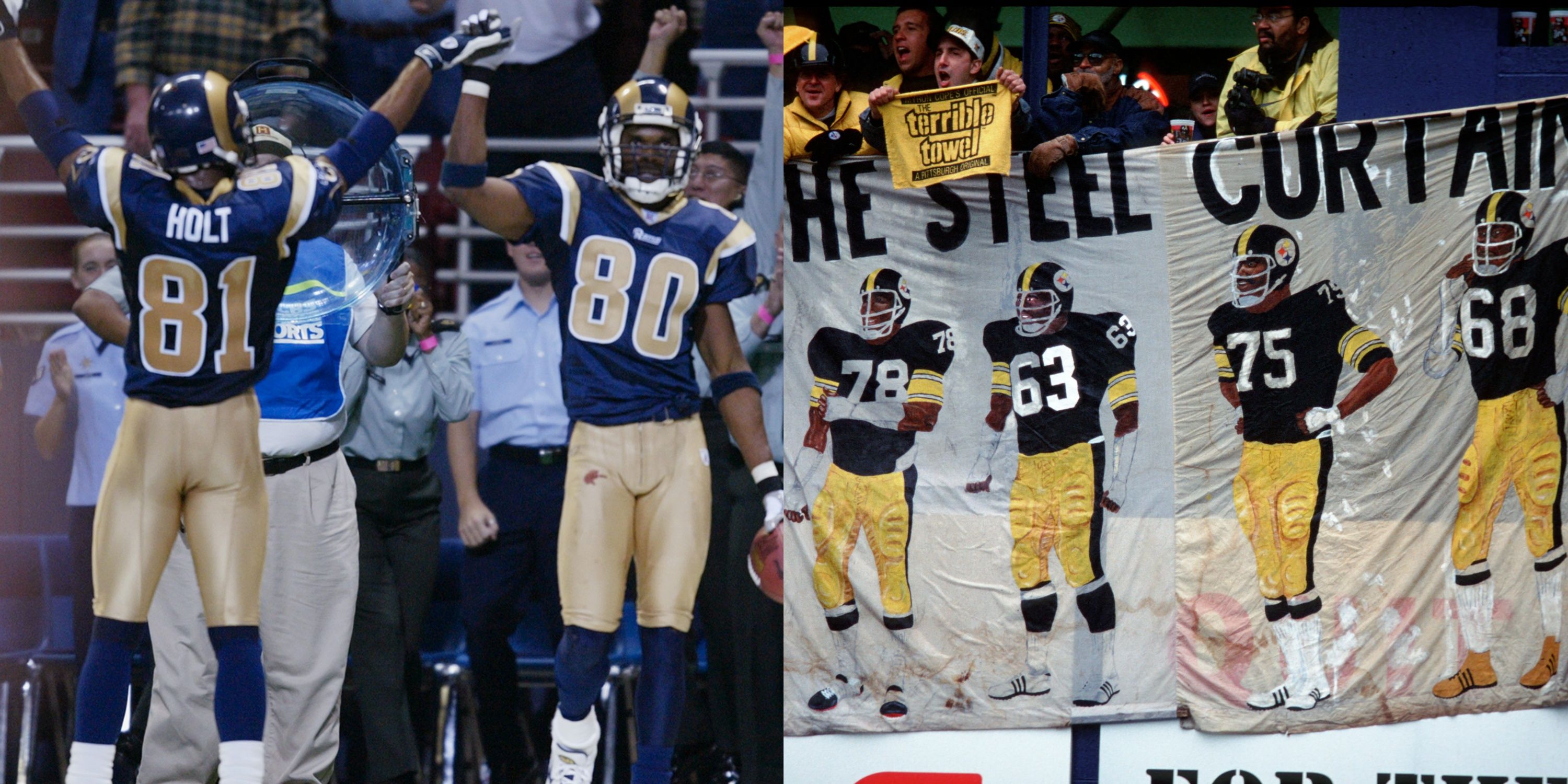Nfl football team nicknames

Other names that were in the mix included Armada, Presidents, Brigade, Redhawks, RedWolves, Defenders and Football Team. Washington's process to. Years later, in Julythe franchise changed its name to the “Washington Football Team,” with the Redskins name being widely seen as. The football fans of Jacksonville selected the nickname of their nfl football team nicknames intwo years before the Jaguars made their debut via a contest. From. NYJ - The Buttfumble. NYG - New York Derp. DAL - The Cowgirls. SEA - The Waterpidgeons.
How did the NFL teams get their names? Origin of their nicknames
How All 32 NFL Teams Got Their Names
The nickname Steelers was picked by Art Rooney Sr to honour the history of steel production in the region. One of a handful of teams to never change their city or nickname, the moniker 49ers was suggested by co-owner Allen E. Sorrell as a tribute to the men who rushed west in search of gold in Seahawks, proposed by people, was eventually selected by General Manager John Thompson.
The team kept its Oilers nickname initially when it was relocated from Houston to Tennessee in But after two seasons as the Tennessee Oilers, owner Bud Adams decided to change the nickname. Having been the Washington Redskins for 87 years up until , Washington simply became the Football Team while a month search for a new nickname was conducted. They eventually settled on Commanders in due to the military connection to the US capital.
Your email address will not be published. Save my name, email, and website in this browser for the next time I comment. Search Close this search box. We have delved into the history of how each team in the NFL got their nickname. Atlanta Falcons The Falcons were given their name via a contest in which saw separate nicknames submitted. Baltimore Ravens Baltimore was formally home to the Colts before they left town and in were replaced by the relocating Cleveland Browns.
Buffalo Bills Formerly called the Bisons, fans were given the chance to rename the team in with James F. Cincinnati Bengals Paul Brown, synonymous with fellow Ohio franchise the Cleveland Browns, formed the Bengals in after three years away from football. Dallas Cowboys Originally named the Steers and then the Rangers, Dallas was forced to change its name from the season due to the nickname Rangers also being used by a minor league baseball team in Dallas.
When Acme Packing came on board as a sponsor in , the name Packers made more sense than Indians and stuck Houston Texans Houston went through several months of intense nickname research when awarded a franchise in , producing five candidates; Stallions, Bobcats, Texans, Wildcatters and Apollos. Indianapolis Colts This nomadic franchise has previously been called the Miami Seahawks and Dallas Texans, with a stint in between as the Baltimore Colts.
Jacksonville Jaguars The football fans of Jacksonville selected the nickname of their team in , two years before the Jaguars made their debut via a contest. Los Angeles Rams Wherever the franchise has called home in its year existence, be that Cleveland, St.
Las Vegas Raiders After starting out life as the Oakland Senors following a name the team contest in a local paper, the team pivoted to Raiders after just nine days as the Senors in following a massive backlash. Pittsburgh Steelers Another franchise that shared its name with a baseball team originally, the Pittsburgh Pirates became the Pittsburgh Steelers in following a name the team contest.
San Francisco 49ers One of a handful of teams to never change their city or nickname, the moniker 49ers was suggested by co-owner Allen E. Nfl football team nicknames Tennessee Titans The team kept its Oilers nickname initially when it was relocated from Houston to Tennessee in Washington Commanders Having been the Washington Redskins for 87 years up until , Washington simply became the Football Team while a month search for a new nickname was conducted.
Chris Rivers. Chris is broadcast and written journalist with a wealth of experience, across a number of different sports. As well covering football on the radio, he is a regular online and print contributor on the likes of rugby union, American Football and Formula One. All Posts. Related Posts. Leave a Reply Cancel reply Your email address will not be published. Facebook Twitter.
What followed was arguably the greatest run of defensive performances in NFL history as the Steel Curtain shut tight and Pittsburgh recorded a remarkable five shutouts in their next nine games, allowing a paltry 3. Ask any British fan in their 40's what their earliest memories of the NFL are and many of them will invariably say the '85 Bears, Mike Ditka and of course William Perry.
The pound "Refrigerator" and the rest of the Bears defence were so dominant that the "Monsters of the Midway" nickname, inspired by a popular area of the Windy City and used to describe their defence in , was gleefully resurrected. And monsters they were, ranked first in the NFL in points and yardage allowed, boasting the league's sack leader in defensive end Richard Dent and helping the Bears to reach the playoffs with a regular season record.
However, Chicago were just getting started and posted two straight shutouts in the postseason before steamrolling the New England Patriots in the Super Bowl, a game which included a memorable touchdown for Perry. And if you haven't had the pleasure already, we would highly recommend checking out the "Super Bowl Shuffle" on YouTube, a song firmly in the novelty category but which was remarkably nominated for a Grammy.
When it comes to the New York Jets, being called "Gang Green" is all well and good but we can't include a nickname that takes its inspiration from a degenerative tissue disease - even if it does refer to the Jets.  Instead we'll focus on former NYC Police Officer Dan O'Connor, who is an unlikely part of Jets history after winning a magazine competition in , coming up with the "New York Sack Exchange" nickname for the defensive front of his beloved team.
Instead we'll focus on former NYC Police Officer Dan O'Connor, who is an unlikely part of Jets history after winning a magazine competition in , coming up with the "New York Sack Exchange" nickname for the defensive front of his beloved team.
However, what is less well-known is that the frequency with which the New York sack Exchange brought down the opposition quarterback actually contributed to the NFL beginning to count sacks as an official statistic for the very first time. Not because he's a two-time Super Bowl winner but due to the fact he is one of the only quarterbacks in the mid's who didn't have to face the Big Blue Wrecking Crew and arguably the greatest defensive player of all time, Lawrence Taylor.
Simms has spoken on numerous occasions about how relieved he was that he played on the same side as LT, although we would imagine training was no picnic. His fellow NFC East signal callers were not so fortunate and from to , the Giants dominated the division off the back of a fearsome defensive unit more than worthy of their imposing nickname.
And that divisional dominance extended to the NFL in general, as the Giants won two Super Bowls in and , the latter run including a remarkable stretch of 10 straight games where Big Blue conceded less than 20 points. One of the most flamboyant nicknames in NFL history is also worthy of a lofty place on this list, given that it is one of the few that references a team's offence.
And what an offence it was as the St Louis Rams side of the early 's was one of the greatest attacking forces in NFL history. Originally referred to as "The Greatest Show on Earth", which was a reference to the famous circus marketing slogan, some bright spark replaced "earth" with "turf" and one of the best nicknames in NFL history was born. Records tumbled like Super Bowl confetti and speaking of the big game, the Rams made two appearances, beating the Tennessee Titans in and narrowly losing to a Tom Brady-inspired New England Patriots side in You'd be reading until Super Bowl 75 if we laid out all the records that the rampant Rams broke in this historic period, but the most impressive statistic is that the 1, points they plundered, remains to this day the most points scored by an NFL team over any three-year stretch.
One of the more obscure sobriquets you can tell we're running out of synonyms by now on this list is also one of the best, with the Minnesota Vikings defensive line that terrorised opposition quarterbacks for a decade from the late sixties given the name "The Purple People Eaters". The inspiration for this gem of a nickname came from a little-known song from the 's called, drumroll please, "The Purple People Eater".
So it's no surprise that one of the most dominant forces in NFL history came to be known by this moniker, given the colour of their jerseys and their predilection for tearing into the opposition with the enthusiasm of a hot dog eating champion. They also had a formidable motto which must have sent chills down the spine of many an NFL signal caller, which was simply "Meet at the quarterback.